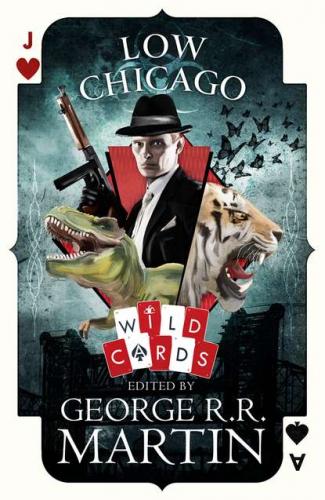“What are you, a history buff or something?” Croyd asked.
“Or something,” Nighthawk said quietly. “It was pretty terrible. But, look, what else happened here in Chicago in 1919?”
Croyd, thumbing through the paper, looked up. “What?”
“The Black Sox scandal! The year the White Sox threw the World Series to the Cincinnati Reds.”
Croyd’s eyes widened. “Flowers would be drawn to that like a fly to shit. But is the Series still going on? Wait a minute.” He flipped the pages more quickly. “Here it is.” He looked up at Nighthawk. “Game seven is at Comiskey Park this afternoon.”
Nighthawk frowned in concentration. “Give me a minute … Yes, that’s right. The White Sox win today, four to one.”
“Wait,” Croyd said, “the White Sox won game seven? I thought they threw the Series—”
“This was one of the years when the World Series was a best of nine.” Nighthawk signaled to their waiter. “Pay him,” he told Croyd, when the boy came over.
“Wait,” Croyd said again. “They played a nine-game World Series? You knew that?”
Nighthawk smiled. “I’m a baseball fan.”
“Where are we going?”
“I know a man—”
“You know a man?”
“I’ll explain later,” Nighthawk said as the waiter came back with their change. They had a little less than nineteen dollars left.
“You’d better. Just where are we headed?”
“You know that Black Belt I mentioned?” Croyd nodded. “We’re going to a part of it called Bronzeville.”
The geography of Chicago hadn’t changed all that much in a century, and the details of it came back to Nighthawk quickly. The Palmer House was located fairly near the northern edge of the Black Belt, which ran about thirty blocks, from Thirty-first to Fifty-fifth Street along State Street, but, as indicated by its name, was only a few blocks wide. The heart of Bronzeville, Chicago’s Black Metropolis, was around Forty-seventh Street.
They took the el, and got off at a pleasant neighborhood that consisted of rambling single-family homes interspersed with business centers lived in and run by blacks. It looked fairly prosperous, except for some spots of destruction they passed where buildings once stood but had obviously recently been burned to the ground. Rubble still remained in many of these spots like broken teeth in an otherwise healthy smile.
“Results of the riots?” Croyd asked.
Nighthawk nodded grimly. “Yes. Like I said, Irish ‘athletic clubs’ paid the hood a visit. And since most of the cops were Irish themselves, they weren’t too interested in restraining their friends. It took five thousand National Guardsmen to enforce the peace.”
“Doesn’t sound pleasant,” Croyd said.
“It wasn’t,” Nighthawk muttered. Before Croyd could question him further, he said, “Here we are,” and turned up the steps of a pawnshop that was in a row of businesses—grocer, barbershop, drugstore, and other small stores.
Inside it was well lit, airy, and spick-and-span clean, with shelves stocked with every kind of item you might be looking for, from clothes to tools to furniture. Near the front, behind a glass counter that was divided by display cases containing guns—small arms, mainly—and jewelry, stood an immense black man. He was fashionably and expensively dressed, with diamond rings on both pinkies and a diamond stickpin in his tie that was the size of a walnut.
“Hello, Ice,” Nighthawk said.
The man looked at him, frowning.
“You know my father,” Nighthawk said.
“John Nighthawk,” the man said, his face lighting in a broad smile. “You favor him, most precisely.”
Croyd opened his mouth and Nighthawk stepped on his foot.
“I’m happy to say that I do,” Nighthawk said. “He’s a good-looking man.”
“Yes, indeed,” the Iceman said.
“This is my friend, Mr. Crenson,” Nighthawk said, indicating Croyd, who smiled and nodded.
“Any friend of John Nighthawk’s son is a friend of mine,” Ice said. “Welcome to Bronzeville.”
“Thanks,” Croyd said. “It looks like a swell place.”
Ice nodded. “What can I do for you—” He paused.
“John. After my father.”
“—John?”
“Mr. Crenson and I just got into town and we’d like to attend the game this afternoon—”
Ice smiled broadly. “So you came to see Ice?”
“We know it’s a hard ticket. We’re willing to pay—”
Ice made a dismissive gesture. “I got what you need, boy, but the money of John Nighthawk’s son is no good here.” He reached into his waistcoat pocket and came out with a sheaf of tickets. “Good thing you got here now, though. I was just going to send my boys out to see what we could get for them. All prime seats. Here, take two.”
Nighthawk knew better than to argue. “Thanks, Ice.”
As he handed over the tickets, the pawnbroker said, “Since you’re just back in town—a warning. I hope you don’t have any business going on the game.”
“Business?” Nighthawk asked. “You mean a bet? No. Is it rigged?”
“Sure as hell is. It’s not well-known, but Ice knows all. He hears everything. You can’t fart in my town without me knowing. That eastern trash comes to our town with their dirty money and bribes our boys to throw it!” There was real anger in Ice’s voice and eyes. “Thank God our boys aren’t part of that filthy deal.”
“Our boys?” Nighthawk asked.
“You know—Smokey Joe and the Thunderbolt. They wouldn’t take dirty money. They wouldn’t let Chicago down.”
“No,” Nighthawk said thoughtfully.
“Anyway …” Ice brightened some. “Smokey Joe Williams is pitching today, and he’ll show them. Tomorrow, though …” He shook his head. “The white boy is going, the other Williams, Lefty. Bet on Cincinnati if you want to, but I wouldn’t dirty my money.”
“Nor would I,” Nighthawk said.
“Damn right. Well …” Ice smiled as they turned to go. “You remember me to your daddy. And tell him to come by sometime soon. He always brings the best when he comes to visit.”
“I will,” Nighthawk said as they left the shop.
Croyd looked at him. “What the hell?”
